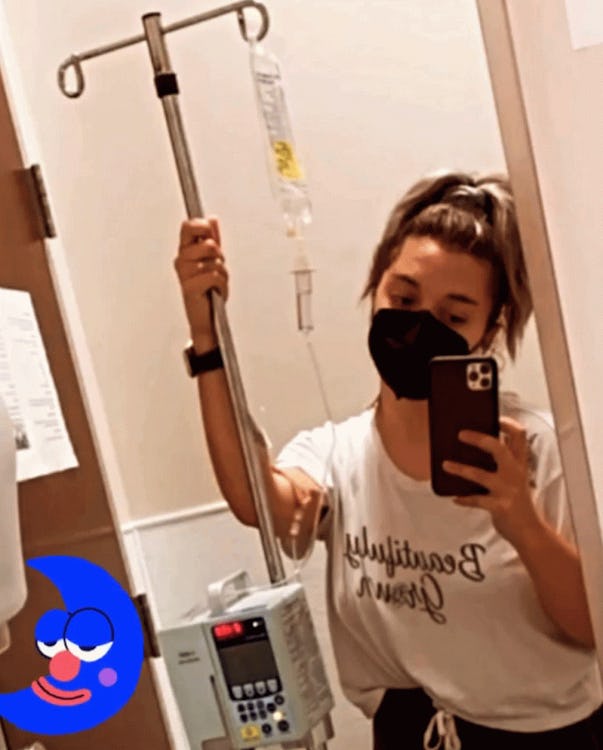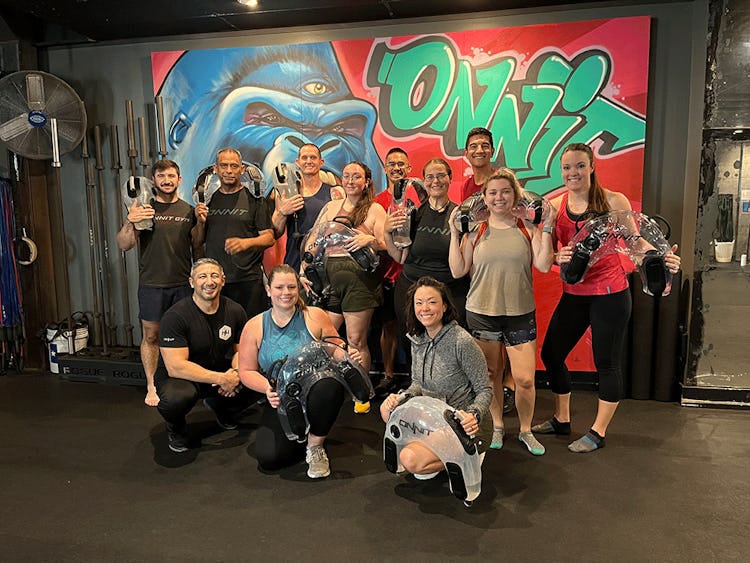May 30th is World MS Day, and this year, it’s really hitting home with the staffers at Onnit. Maggie Cunningham, Onnit’s Social Media Community Manager, was recently diagnosed with multiple sclerosis (MS). In support of Maggie and others battling MS, we’re hosting a fundraising event on June 3rd to benefit the National MS Society. The Onnit Office Olympics will be open to employees in person, and virtually to all others who wish to participate. (See more about the event at the bottom of this page.)
Read about Maggie’s MS journey below, and make your contribution at the Onnit Social Responsibility Committee’s donation page. Onnit will match all donations up to $1,150.
“Don’t Tell Me You’re Sorry”: How Onnit’s Maggie Cunningham Is Facing Down MS

It started with stomach pain, but this was no garden-variety bellyache. Maggie Cunningham, age 20 at the time, hurt badly enough that she had to avoid food altogether, and if she did eat, she felt dizzy. Maggie stopped going to work and school, and confined herself to the couch. In three weeks, she lost 50 pounds.
It would be another decade before doctors found out what was wrong.
Multiple sclerosis (MS) is an autoimmune disorder where the body’s immune system mistakenly attacks the myelin sheaths (protective coverings) of the nerve cells in the brain and spinal cord.
The effect is like an electrical wire that’s had some of its rubber coating worn off—when the nerve fiber inside is unprotected, nerve transmissions can be slowed or blocked. The body will try to repair the damage, but in doing so leaves scar tissue in the affected areas. Sclerosis means scarring, hence the term multiple sclerosis.
Symptoms are highly variable, which makes MS difficult to identify. Nearly one million people in the U.S. live with MS, and roughly 200 new cases are diagnosed each week. To date, there is no cure. The most famous MS case in recent years may belong to actress Selma Blair, who made a documentary about her struggle in 2021.
On Pins and Needles
Maggie, from Austin, TX, never liked going to the doctor. As a kid, she was diagnosed with vasovagal syncope—a condition where certain triggers cause enough emotional distress to make your heart rate and blood pressure drop suddenly, resulting in fainting. Maggie’s trigger was medical settings.
Confronting with anything to do with doctors, hospitals, medical procedures, or health troubles provokes a visceral reaction. For years, she ran the risk of passing out when getting a shot, or even waiting in an examination room.
“I don’t know where it started,” she says. “Doctors have asked my mother if I had a traumatic birth, but I didn’t. I can remember being in the fourth grade, reading a book in class about a guy who went blind by stabbing himself in the eye. That made me fall backward in my chair! Then I threw up on the teacher.”
Maggie laughs. “But that’s fine. She was a mean lady anyway.”
So, when Maggie’s stomach pain and wasting got too serious to wait out any longer, her family had to take her to the hospital by force.
A doctor told Maggie she was merely constipated, and that cutting out meat, dairy, and gluten would solve it. She was compliant for the next six months, and while the pain and disorientation abated, she didn’t feel normal.
A few years passed, and in 2015, Maggie was bending over to pick up a box at work. “It was heavier than what I should have tried to lift on my own,” she says, “but I have trouble asking people for help.” She immediately noticed a tingling sensation, like pins and needles, in the skin around her stomach.
By the end of her shift, the feeling had spread around the right side of her back to her spine.
By the end of the week, it had moved down to her toes.
MS often causes odd sensations in the legs and arms, due to the nerve signals being interfered with. This can progress to loss of power in the limbs, pain, spasms, and difficulty walking. Symptoms can come on over the course of a day or two and last days or weeks, usually resolving—or at least improving—on their own, as the body attempts to heal itself.
MS can also result in blurred or lost vision in one eye, fatigue, incontinence, sexual dysfunction, and, if for no other reason than it’s so challenging to live with, depression.
MS usually shows up in people between the ages of 20 and 40, but it can strike anyone at any time. Low levels of Vitamin D are associated with increased risk, as is being overweight, and women are three times as likely as men to get relapsing-remitting MS—the most common type, which is characterized by repeated attacks, or relapses.
White people, particularly those living in the northern U.S. and Canada, have the highest rates of MS.
Searching for Answers… And Finding More Questions

Maggie went to a chiropractor who assumed the tingling was due to a pinched nerve sustained from picking up the heavy box. She got some adjustments, and it went away. A year later, the feeling came back, but this time in her hip. A doctor gave her corticosteroids to no avail, but the issue once again resolved on its own within weeks.
In 2017, Maggie started work at Onnit as a Customer Service Representative. Her first week on the job, the tingles struck one of her legs. To add to the confusion, her eyesight was affected as well. “I could see, but I couldn’t focus on anything,” she says. “I felt like I was going cross-eyed. But at the time, I just thought I was adjusting to having a desk job and sitting in office lighting in front of a computer.” She was all right again within days.
Another two years passed, and Maggie was working out at Onnit Gym. She started feeling back pain in the midst of an exercise. She told Coach John Wolf, Onnit’s Chief Fitness Officer, she felt like there was a gremlin next to her spine. “He told me to stop the workout, which was great, because I’m the kind of person who will keep pushing even when my body is screaming not to.”
Another chiropractic treatment brought no relief, and the next day, Maggie couldn’t feel anything but tightness from her waist to the middle of her thigh on both legs. “I was waddling around the office feeling like I was wearing a wetsuit that was three sizes too small.” The day after that, she could hardly breathe due to restriction in her chest.
An MRI revealed bulging discs in her low back, as well as arthritis, but these aren’t uncommon conditions in most adults, and they often don’t manifest with symptoms.
“I started seeing a physical therapist,” says Maggie, “but the problem kept getting worse until I couldn’t get out of bed for six weeks. I worked from home for the next two months until it went away.”
Maggie continued assembling a small army of professionals to help her live a (somewhat) normal life. A functional medicine clinic and dietician identified low Vitamin D levels. (That’s putting it mildly: normal D levels are thought to be 20–50 ng/mL, and Maggie’s were at 14—low enough to be associated with a higher risk of all-cause mortality).
Lifestyle changes brought tenuous improvements, but by the end of 2019, she was in a near-constant struggle with her body. “My leg would go numb and then fix itself,” she says. “Then my hands, and they would fix themselves.” Sometimes her thinking would be so clouded that she’d have to step away from her work and take a 10-minute walk to clear her head.
The bad doctors told her that all the symptoms—from the gut pain, to the numbness and tingling, to the complete loss of feeling in her muscles—were all a figment of her imagination. The better ones believed it was a musculo-skeletal problem, likely caused by some injury. But it was becoming clearer that the issue was neurological. By May 2021, Maggie’s physical therapist threw her hands up in defeat.
“She said, ‘You’ve been coming here two years, and while I can keep helping you manage your symptoms, we need to find out what the underlying cause is,’” Maggie says. Suspecting an auto-immune disorder, the PT told her to see a rheumatologist.
Getting blood drawn required a friend to hold her hand, and lying down to keep calm, but Maggie got through it. And her labs came back… normal.
“I walked away from the rheumatologist sobbing,” Maggie says. “I texted my friend Chanda [Mise, Onnit’s Sr. Director of Customer Experience]. I said, ‘Why can’t I ever leave a doctor’s office with answers? I’m so frustrated.’ But as we talked, I realized that the worst symptoms always came in times of extreme stress.
“It started getting really bad and not going away in 2019, when I was planning my wedding, and I was working almost every day. I have a tendency to overwork myself to the point where my body starts screaming at me.
“Chanda said, ‘OK, you’ve figured out your trigger. So treat that, and wait till doctors meet you halfway.’”
Maggie had learned to use breathing techniques, psychotherapy, and anti-anxiety medication to help manage her vasovagal syncope, and they could mitigate this mystery disease too.
Fortunately, Maggie didn’t have to wait much longer for the revelation. The rheumatologist referred her to a neurologist who ordered an MRI of her brain, thoracic spine, and spinal cord, requiring Maggie to lay in the noisy plastic tube for 90 minutes—but finally, in August 2021, she had an answer.
“When the MRI came back, the neurologist showed me the lesions on my brain and spinal cord, and said I have relapsing-remitting MS”—the type identified in approximately 85% of MS cases. It was three weeks before her 29th birthday.
“I kind of blacked out when I heard it,” says Maggie. “My husband started asking questions, but I zoned out from shock.”
As the information sunk in, Maggie’s reaction was more relief than grief. “I had spent most of my life at that point being told by doctors that any health issue I came to them with was ‘All in my head.’ Well, the joke was on them, because it turns out that it literally was in my head—and also in my spinal cord and nervous system… So please, don’t anyone tell me you’re sorry. That’s my only request.” Maggie is just happy to finally know the truth.
As it turns out, Maggie’s great aunt has MS too, though the family never spoke about it, and Maggie never knew. At 85 years old, the aunt is perfectly healthy, apart from some vision problems. While your risk of getting MS is higher if it runs in your family, it’s not thought to be a hereditary health problem. You’re only one percent more likely to get MS if a parent or sibling has it.
Life Goes Onnit

Maggie’s neurologist explained that her treatment options included daily pills, drugs she could inject herself, or an infusion. While all are effective, each came with its own caveats. So powerful were the pills that if she missed a dose, she’d have to take her next one under medical supervision to ensure she didn’t have a bad reaction. Her fear of needles made self-injections out of the question, and that left only the infusion (which, luckily, was the doctor’s recommendation anyway).
“Up until the needle goes in, I’m scared,” says Maggie, laughing. “But once it is, I’m totally fine.”
The infusion contains a monoclonal antibody. It kills T-cells, essentially weakening the immune system so that it doesn’t attack the nerves so hard. The main side effects are fatigue for a few days afterward, and an increased risk of infection. “It takes longer to heal from cuts now when my dog scratches me,” Maggie says. “So I eat well and do everything else I can to keep my immune system strong.”
With prep and post-treatment observation, the infusion process takes eight hours, but Maggie only needs to do it twice a year. Thank goodness for medical insurance, as the treatment costs $99,666.43 each time.
(Yes, that comma and decimal point are in the right places. The total lifetime cost of treating MS, per person, has been estimated at $4.1 million.)
But so far, it’s been worth every penny. “Stress is my trigger,” says Maggie. “The last 10 months have been really hard, as my marriage was breaking up. If I hadn’t started the infusion therapy when I did, I’m pretty sure that I would be almost completely disabled now.”
Armed with the medicine, Maggie hasn’t had to modify her lifestyle too greatly. She avoids pro-inflammatory foods (including starches, although she still enjoys potatoes), and keeps her gut microbiome balanced with probiotics and prebiotics.
Extreme temperatures tend to aggravate symptoms in MS patients, and that can be challenging for a Texas resident. “If it’s over 85 degrees outside,” Maggie says, “that strip from my waist to my knee feels like it’s burning. But if I go inside and sit by a fan, it goes away. If it’s cold out, my knees hurt.”
Maggie remains as active as possible. She’s even helping test out the upcoming Onnit 6 Hydrocore workout program before it’s released to the public. (Each Onnit 6 program is given a dry run by volunteers from the Onnit staff. The program is then tweaked according to their feedback before its debut.) It’s the first structured routine Maggie has been able to commit to in three years. “Working out [in general] is good for MS,” Maggie says. “The workout activates the nervous system, but the cooldown is the most important part for me. It helps me regulate my heart rate, which calms down my nervous system and lessens my symptoms.
“MS has made me listen to my body more,” says Maggie. “I’ve learned where my limits are and not to push them too hard.”

Maggie’s current title is Onnit Social Media Community Manager. Part of her job is acting as an administrator in the Onnit Tribe—Onnit’s private support group on Facebook and Discord. Members of the Onnit community (fans, customers, and employees) post in the forums, sharing thoughts and feelings about their workouts, as well as their personal lives.
Maggie is known for rallying behind members when they need encouragement, and now they’re doing the same for her.
“I had been open about my medical problems in the Tribe until my marriage started to fail,” she says. “Then I just felt like I had to pull away for a while. But I remembered how anyone can be completely honest in the Tribe, and how helpful it is to share. So now I’m back, using my posts in the Tribe to log how I’m feeling, and also for accountability on the Hydrocore program.
“Working in social media is so helpful in times like this, because I can connect with other people who are experiencing similar things. Whether it’s someone who’s immune-compromised or has MS, it’s just nice to know I’m not alone in this. Even if I’m not sitting next to the other person who’s struggling, I can connect with them and engage.”
She credits her team and coworkers at Onnit as well. “The fact that I can talk openly about my disability at my job speaks volumes about this place. I’ve heard so many stories from people about how badly or unfairly they were treated at work because of a health problem. But I haven’t experienced any of that. I’m still treated the same and provided the same resources and opportunities that everyone else at Onnit is. If I didn’t have Onnit, I’m not sure how I would have processed all this.”
Maggie calls MS an “invisible disease.” She may look fine on the outside, but could be experiencing multiple symptoms at any given time. She doesn’t know if her condition will get worse over time, or in what ways it may affect her future.
“As someone who is a planner,” she says, “that’s hard for me. I’m a type-A personality. A control-freak. So having to take each day as it comes has been very different for me, but very rewarding too.
“I’m still me. I’m still out there being loud and opinionated [laughs]. I’m trying to enjoy life, and I’m learning not to focus on what I can’t control. At the same time, I’m tackling this in every way possible.”
She still regularly sees a physical therapist, psychiatrist, primary care doctor, and neurologist. One of the silver linings to her MS has been its effect in helping her overcome her fear of medical settings, to a degree. Another has been gaining the ability to ask for help when she needs it.
If she chooses to have children one day, MS likely won’t complicate it. Women with MS can safely carry a baby to term. In fact, expecting mothers often get relief from symptoms during pregnancy.
If you’re currently dealing with MS, or symptoms that may reflect it, Maggie urges you to take them seriously. “Don’t let doctors gaslight you,” she says. “Keep going until you get an answer, and know that there are people out there who will offer support.”

* * *
The Onnit Office Olympics in support of the National MS Society will take place at 2:00 p.m. on Friday, June 3rd. Inspired by elementary-school track and field events (as well as The Office TV show), the Olympics will feature a mobility warmup and relay races, as well as some mental gymnastics (riddle-solving, a paper airplane folding contest, and more). Onnit employees are invited to participate in person at Onnit Gym, but all others are welcome to participate virtually by logging onto TBD.COM, where the event will be live-streamed.
Donations can be made at the Onnit Social Responsibility Committee’s donation page, which benefits the National MS Society. Onnit will match all donations up to $1,150.
For more information about MS, visit the National MS Society.

)






